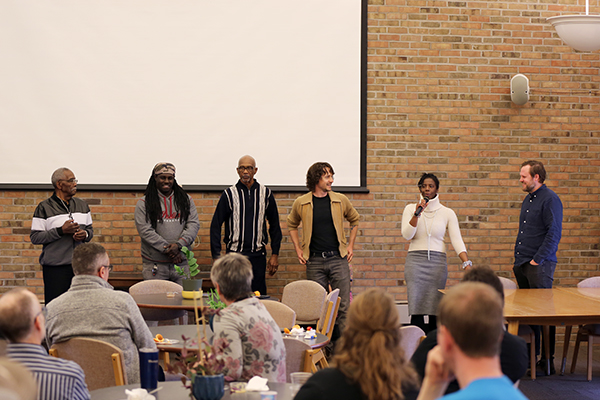written by Annette Brill Bergstresser for Anabaptist Mennonite Biblical Seminary
ELKHART, Indiana (Anabaptist Mennonite Biblical Seminary) — A new documentary that features stories of life in Elkhart’s predominantly African American Benham West neighborhood — known as “the village” — will premiere on Friday, May 19, at the Crystal Ballroom at the Lerner Theatre at 410 South Main Street, Elkhart, Indiana.

Titled What Happened at Benham West: African American Stories of Community, Displacement and Hope, the film also includes elders’ experiences of segregation in Elkhart, documents the process of the city’s eventual clearing of the Benham West neighborhood, and names the elders’ hopes for their city.
Anabaptist Mennonite Biblical Seminary (AMBS) is hosting the launch event to celebrate the release of the 80-minute documentary. The event will begin at 6 p.m. with a reception with light refreshments, and the documentary presentation will begin at 7 p.m. There is no charge to attend, but space is limited to 300 participants, and registration at benhamwestproject.com by May 12 is recommended.
“I never realized the project would get this large, but I’m impressed,” reflected Rev. Willie Jean Mayes of Elkhart, who served on the advisory committee for the history project and was interviewed for it. “I’m impressed by the work that has been done, by what has been accomplished, and that it has been moving forward. The passion has impressed me — that someone wants to save the history. That’s what touches my heart.”
“Stories are disappearing”
AMBS has sponsored the Benham West project through the collaborative work of two faculty members: Nekeisha Alayna Alexis, MA, Intercultural Competence and Undoing Racism coordinator; and Jamie Pitts, PhD, Associate Professor of Anabaptist Studies and Director of the Institute of Mennonite Studies.
The idea for the project was sparked during AMBS’s Rev. Dr. Martin Luther King, Jr., Day program in January 2020 on “Repairing the Harm: A Community Conversation on the Systemic Exclusion of African Americans in Elkhart.” At the event, local African American leaders Rev. Mayes and Rev. Dr. Plez Lovelady participated in a panel discussion on the topic.
Alexis recalled that Rev. Mayes said, “These stories are disappearing of the Benham West neighborhood — not just the clearing of it, but all the things that came before the clearing. There’s no documentation about the South Side School or about the life that was there, and once these elders pass away, it’s going to be gone.”
Rev. Mayes’ words echoed throughout the MLK Day event, and other participants also emphasized the need to name and address both current and past harms in the community. In response, and with the encouragement of elders and allies both within and beyond Elkhart, Alexis and Pitts were given AMBS’s blessing to coordinate a team to produce both a documentary and a book on the topic. Former AMBS student Patrick Obonde (MA 2020) served as project assistant, and Oliver Pettis of Black Lion Cinematography in Elkhart was hired to be the filmmaker. The book, which has the same title as the film, will be published later this year by Wolfson Press of Indiana University South Bend.
Benham West’s history
Pitts described how the Benham West community first began in the 1920s when African Americans moved from the south to Elkhart to work for the railroad. The neighborhood was located west of Benham Avenue and south of the railroad tracks.
“Between the 1920s and 1970s, it was really the only neighborhood where African Americans were allowed to live in Elkhart,” he said.
Benham West residents started businesses to serve their neighbors, and “the village” became “a place of care, a place of community, a place of thriving,” Pitts said. But in the 1960s, after the government had started funding urban renewal projects following World War II, the city built the Rosedale Tower and Washington Gardens in the area.
“The entire neighborhood was cleared with a promise that it would be renewed. Residents were asked to come up with a plan, and they did, but some of the people who worked for the city rejected the plan, and no plan was ever put in place,” he said.
Rev. Dr. Lovelady of Elkhart, who also was interviewed for the project and served on the advisory committee, reflected on the importance of understanding a place’s history: “Once you take the eraser of time and rub that across the pages of humanity, those following don’t know what was there. History — growing up in Benham West — that’s all we knew, and it was a wonderful time because we had family and we had community — something that we really don’t have anymore.”
Rev. Mayes added, “There’s a lot of people in Elkhart who don’t know what happened. People who grew up elsewhere are going to be surprised to learn how things were. There is so much that has changed, and so much that has regressed. My heart gets sad when I see that.”
“The elders still have hope”
Alexis noted that the project is rooted in the call, the involvement and the stories of the elders.
“The interviewees have been so grateful that somebody is telling this story with this much care and interest — in a time when so much is being done to erase the facts of people’s experiences — and I don’t take that lightly at all,” said Alexis. “I feel a lot of gratitude that people are entrusting us to do this project.”
She hopes that the project, which has taken three years of careful listening to complete, can spark concrete change.
“We don’t know what it will look like, but the elders still have hope,” she said. “People are still living with the repercussions of what happened. How can this project be part of remediating a situation that needs to be repaired?”
Rev. Mayes hopes the documentary can help influence how the city invests its money. She said, “If part of a city is sick, then the whole city is sick. You have to be able to build around the history and what is unique.”
Rev. Dr. Lovelady hopes the film will offer “closure and a progressive move for things in our city — not hanging onto yesterday, but moving into a brighter arena that will benefit not only people now but also people in the future.”
Participants and supporting organizations
The Elkhart Black History Project Advisory Committee oversaw the project; members include Rev. Jon Brown, Daniella Panetta and Jason Shenk, in addition to Rev. Mayes and Rev. Dr. Lovelady. Other elders who are featured in the documentary and book include Bonnie Clark, Phyllis Davis, Christine Edgerton, Arthur Fisher, Travis Jackson, Nadine Johnson, Glenda Love, Steven Millsaps, Sondra Mose-Ursery, James Otterbridge, Esther Pettis, Elkhart Mayor Rod Roberson, Jean Robinson, Leroy Robinson, Jr., and Charles Walker.
A grant from the Community Foundation of Elkhart County provided funding for the history project, and a grant from Indiana Humanities in cooperation with the National Endowment for the Humanities provided funding for the launch event. At the May 19 event, a videographer will be available to record any participants who would like to share their stories as part of the project.
Located in Elkhart, Indiana, on ancestral land of the Potawatomi and Miami peoples, Anabaptist Mennonite Biblical Seminary is a learning community with an Anabaptist vision, offering theological education for learners both on campus and at a distance as well as a wide array of lifelong learning programs — all with the goal of educating followers of Jesus Christ to be leaders for God’s reconciling mission in the world. ambs.edu

